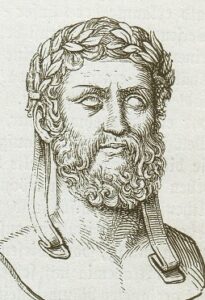Apologia Xenophon 013

Apología de Sócrates
(29-31)
Tabla de contenidos
Ἀπολογία Σωκράτους 013
[29] λέγεται δὲ καὶ Ἄνυτον παριόντα ἰδὼν εἰπεῖν· Ἀλλ᾽ ὁ μὲν ἀνὴρ ὅδε κυδρός, ὡς μέγα τι καὶ καλὸν διαπεπραγμένος, εἰ ἀπέκτονέ με, ὅτι αὐτὸν τῶν μεγίστων ὑπὸ τῆς πόλεως ὁρῶν ἀξιούμενον οὐκ ἔφην χρῆναι τὸν υἱὸν περὶ βύρσας παιδεύειν. ὡς μοχθηρὸς οὗτος, ἔφη, ὃς οὐκ ἔοικεν εἰδέναι ὅτι ὁπότερος ἡμῶν καὶ συμφορώτερα καὶ καλλίω εἰς τὸν ἀεὶ χρόνον διαπέπρακται, οὗτός ἐστι καὶ ὁ νικῶν. [30] ἀλλὰ μέντοι, φάναι αὐτόν, ἀνέθηκε μὲν καὶ Ὅμηρος ἔστιν οἷς τῶν ἐν καταλύσει τοῦ βίου προγιγνώσκειν τὰ μέλλοντα, βούλομαι δὲ καὶ ἐγὼ χρησμῳδῆσαί τι. συνεγενόμην γάρ ποτε βραχέα τῷ Ἀνύτου υἱῷ, καὶ ἔδοξέ μοι οὐκ ἄρρωστος τὴν ψυχὴν εἶναι· ὥστε φημὶ αὐτὸν ἐπὶ τῇ δουλοπρεπεῖ διατριβῇ ἣν ὁ πατὴρ αὐτῷ παρεσκεύακεν οὐ διαμενεῖν· διὰ δὲ τὸ μηδένα ἔχειν σπουδαῖον ἐπιμελητὴν προσπεσεῖσθαί τινι αἰσχρᾷ ἐπιθυμίᾳ, καὶ προβήσεσθαι μέντοι πόρρω μοχθηρίας. [31] ταῦτα δ᾽ εἰπὼν οὐκ ἐψεύσατο, ἀλλ᾽ ὁ νεανίσκος ἡσθεὶς οἴνῳ οὔτε νυκτὸς οὔτε ἡμέρας ἐπαύετο πίνων, καὶ τέλος οὔτε τῇ ἑαυτοῦ πόλει οὔτε τοῖς φίλοις οὔτε αὑτῷ ἄξιος οὐδενὸς ἐγένετο. Ἄνυτος μὲν δὴ διὰ τὴν τοῦ υἱοῦ πονηρὰν παιδείαν καὶ διὰ τὴν αὑτοῦ ἀγνωμοσύνην ἔτι καὶ τετελευτηκὼς τυγχάνει κακοδοξίας.
Perge ad initium paginae huius
Apologia Sōcratis 013
[29] Se cuenta que dijo viendo pasar a Ánito: «Muy orgulloso va ese hombre, como si creyera haber hecho algo grande y bello matándome ; y todo porque le dije un día que, habiendo sido él honrado con las primeras magistraturas de la Ciudad., no estaba bien que su hijo se educara en el oficio de curtidor.1Era el oficio del propio Ánito, su padre, y el del abuelo del jóven. No era que Sócrates despreciara tal oficio, sino que pensaba que el joven, bien dotado intelectualmente, podría dedicarse a cosas más interesantes. En el Menón (91c), es el propio Ánito quien expresa su deseo de que ni sus parientes ni sus amigos sigan las enseñanzas de los sofistas, entre los que incluye al propio Sócrates. El miserable», continuó Sócrates diciendo, «parece ignorar que solo el que de nosotros dos haya pasado toda su vida haciendo cosas benéficas y honestas es el verdadero vencedor». [30] «Por lo demás», añadió, «puesto que Homero atribuye a sus héroes en el momento de su muerte conocimiento anticipado del porvenir, yo también quiero haceros una predicción. Me encontré en cierta ocasión y por breves instantes con el hijo de Ánito, y me pareció tener un alma no exenta de exenta de energía. Le predije, pues, que la condición servil en que su padre le había puesto no dudaría; pero que, por falta de un guía esforzado, caería en cierta pasión vergonzosa y progresaría demasiado en maldad». [31] Y al hablar así, Sócrates no se engañó. El joven se dio al vino; no cesaba de beber ni de día ni de noche, y llegó por fin a ser incapaz de hacer nada útil en bien de la Ciudad, de sus amigos y de sí mismo. En cuanto a Ánito, la mala educación de su hijo, y su propia ignorancia, han hecho, puesto que ya no existe, que su memoria sea odiosa.
Perge ad initium paginae huius
Apology of Socrates 013
[29] It is said also that he remarked as he saw Anytus passing by: “There goes a man who is filled with pride at the thought that he has accomplished some great and noble end in putting me to death, because, seeing him honoured by the state with the highest offices, I said that he ought not to confine his son’s education to hides2The tanning trade had been in the family from at least the time of the boy’s grandfather. What a vicious, fellow,” he continued, “not to know, apparently, that whichever one of us has wrought the more beneficial and noble deeds for all time, he is the real victor. [30] “But,” he is reported to have added, “Homer has attributed to some of his heroes at the moment of dissolution the power to foresee the future; and so I too wish to utter a prophecy. At one time I had a brief association with the son of Anytus, and I thought him not lacking in firmness of spirit; and so I predict that he will not continue in the servile occupation that his father has provided for him; but through want of a worthy adviser he will fall into some disgraceful propensity and will surely go far in the career of vice.” [31] In saying this he was not mistaken; the young man, delighting in wine, never left off drinking night or day, and at last turned out worth nothing to his city, his friends, or himself. So Anytus, even though dead, still enjoys an evil repute for his son’s mischievous education and for his own hard-heartedness.
Perge ad initium paginae huius
Conversaciones en el Ātrium Philosophicum
EN CONSTRVCCION

EN CONSTRVCCION
Perge ad initium paginae huius
OFFICĪNA PHILOSOPHŌRVM ***
